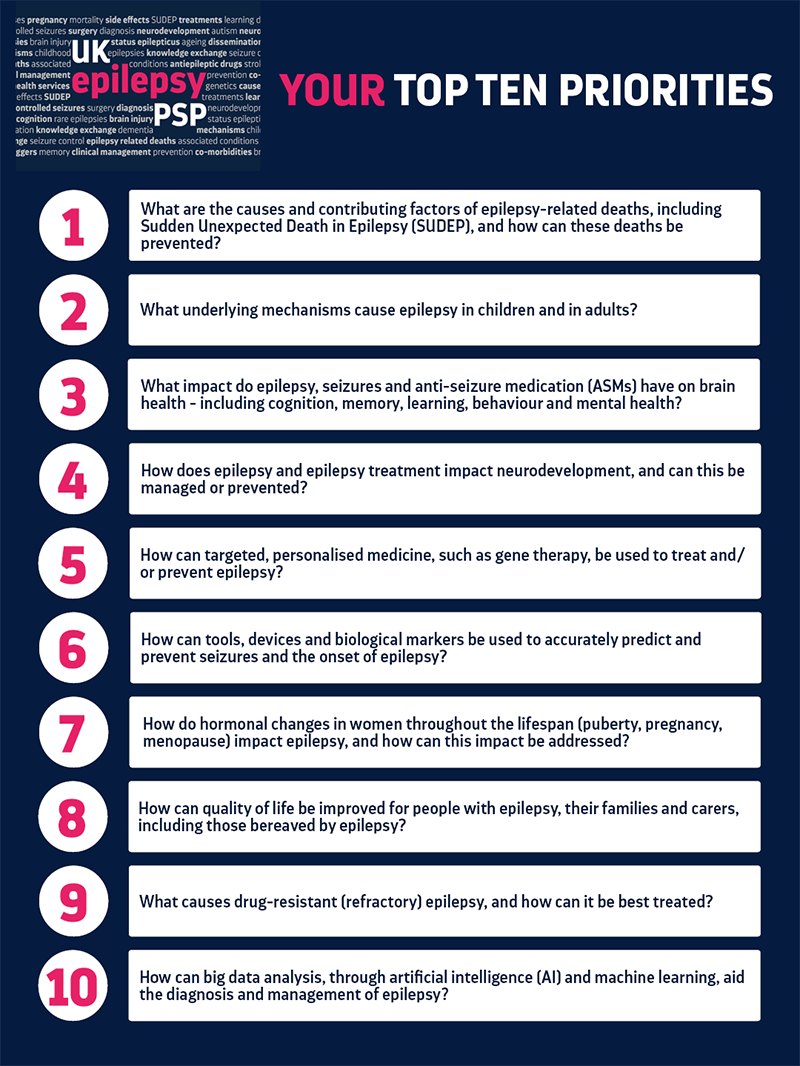Top ten priorities for epilepsy research
The Epilepsy Society has been pleased to work with other epilepsy charities, healthcare professionals and the epilepsy community in drawing up your top ten priorities for epilepsy research.
The resulting priorities, listed below, include themes such as epilepsy-related deaths, the mechanisms underlying epilepsy, women’s health and epilepsy, and drug-resistant (refractory) epilepsy.

The UK Epilepsy Priority Setting Partnership has been led by Epilepsy Research UK in partnership with the James Lind Alliance and National Institute for Health and Care Research.
Nicola Swanborough, Head of External Affairs at the Epilepsy Society said: “It is so important that scientific research is relevant to the lived experiences of people with epilepsy and will make a difference to their lives. Significantly, more than half of those involved in the priority setting project were people with epilepsy.
“Research offers the greatest hope for the future for people with epilepsy and yet funding for the condition is disproportionately less than for other neurological conditions.
“In 2018 the government invested £12.8 million in research into epilepsy (patient population 600,000), compared to £82.5 million into dementia (patient population 850,000) and £34 million in research into Parkinson’s disease (patient population 145,000). It is vital the epilepsy research is targeted in the right direction.”
The eighteen-month-long project used the James Lind Alliance rigorous methodology to identify and prioritise unanswered questions that are most important to those affected by and working in epilepsy.
Unanswered questions
The first of two surveys asked the community what they thought were the most important research priorities for epilepsy. The responses were then grouped into overarching research questions and put through a process to check whether the issue had been previously answered by research.
The unanswered questions were carried forward into a second shortlisting survey for people to rank their own Top Ten research priorities. The final Top Ten research questions for epilepsy were then reviewed, discussed and agreed at a workshop involving equal numbers of people affected by epilepsy and healthcare professionals working in epilepsy.
Next steps
Epilepsy Research UK Chief Executive Maxine Smeaton discussed the next steps for the UK Epilepsy PSP: "Our plan now is to disseminate these priorities with everyone connected with epilepsy – the research community and all those affected by and working in epilepsy – and most importantly to work collaboratively to translate them into action. These Top Ten priorities will provide the evidence needed to influence government and institutional funders to invest more in epilepsy research.”
UK Epilepsy PSP Lead Dr Rhys Thomas said, “The Top Ten research priorities for epilepsy will help shape the research agenda for the next generation. The outputs from this study will benefit people living with epilepsy by providing the evidence of need and priorities to support research development. We know that PSPs can lead to increased funding, which is so urgently needed for epilepsy, given the shocking inequalities in research funding."
